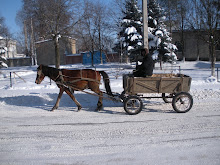 I have to include the video below, despite the fact that most people like, my family, Craig's mom, and incoming volunteers can't understand Romanian. But I know of a few who will appreciate seeing the faces of these girls and hearing their message. Basically, these girls are explaining why we do this activity called "Maxims campaign." The girls explain, between giggles, that the youth council does this activity (hanging positive sayings around town) in an effort to change the way people think about the well-being of our community. Specifically, so that people might stop being indifferent about what goes on here. This week, our maxim roughly translates to 'your talent means nothing without hard work.'
I have to include the video below, despite the fact that most people like, my family, Craig's mom, and incoming volunteers can't understand Romanian. But I know of a few who will appreciate seeing the faces of these girls and hearing their message. Basically, these girls are explaining why we do this activity called "Maxims campaign." The girls explain, between giggles, that the youth council does this activity (hanging positive sayings around town) in an effort to change the way people think about the well-being of our community. Specifically, so that people might stop being indifferent about what goes on here. This week, our maxim roughly translates to 'your talent means nothing without hard work.'In this and other activities, I created some pretty good memories with Moldovan youth this week. First of all, we finished our tour of villages in our "Be the Volunteer, Be the Change" campaign. We could not have come this far without the surprise support of our district council, which provided private transport to all seven villages over the last two months. Next weekend we move to phase two, actually training youth from surrounding villages. We will cover themes such as leadership, volunteerism, and organizing/maintaining local youth councils.
 This photo is included to prove how un-integrated I really am. Moldovans don't smile in most photographs. Doina was trying to teach me this (again), but as you can see, I failed.
This photo is included to prove how un-integrated I really am. Moldovans don't smile in most photographs. Doina was trying to teach me this (again), but as you can see, I failed.This weekend I also attended the regional debate competition for Moldovan high schools. Gah! how much it made me yearn for the churn of my stomach, the pumping adrenaline, and reward of mental exhaustion from my own debate days. Both in English and Romanian (though ironically not Russian, despite that the competition was held in the city of Balti, the Russian capital of Moldova), these youngsters took on the question of Moldovan integration into the European Union. The students on these teams are leaps ahead of their classmates thanks to their participation. For many, it is the only setting in which they have learned to build arguments, follow logic, and prepare research. It's really too bad this can't just be built into the curriculum and be done in the classroom with every student.
I saw two debates (Karl Popper format), with wins split evenly between the affirmative and negative teams. Here are some of the more memorable points made by the students. Not all of these should be adopted as truths, but do provide a good look at what the youth were able to come up with and defend.
Pro-integration:
-Moldova has agricultural goods the rest of Europe can use
-Moldova is already surrounded by Europe, why can't it be included
-Moldova is a tolerable country, proven by the fact that it allows Russian children to attend Russian schools
-Moldova has a quality education system on par with that of Germany and Greece
Against integration:
-Moldova has unresolved political issues right now, such as the election of a president and the conflict with Transnistria.
-Moldova doesn't have a market economy, only one funded by foreign investors
-Moldova doesn't have a comparable education system with the rest of Europe. Moldovan diplomas are not honored abroad, except in Germany and Greece.
-Moldova exports wine, not much else.








































